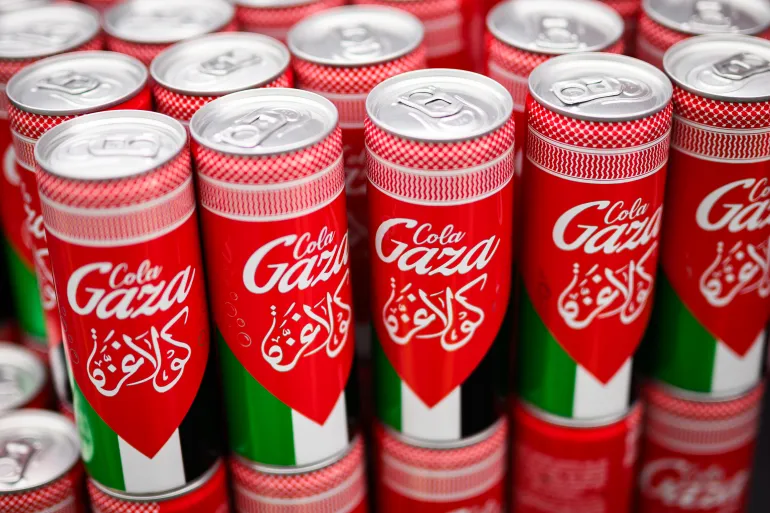In the middle of central London ‘s lively Holborn district, light spills in through the windows of Hiba Express as diners sit around plates piled with falafel and hummus. However, next to the dips and spreads we have all come to appreciate as part of traditional Middle Eastern fare sits something new, shelves of bright red cans emblazoned with Palestinian flags and flowy Arabic calligraphy reading “Gaza Cola.”
“It tastes even better because you’re supporting Palestine,” says Nynke Brett, a Hackney resident sipping the beverage during a recent cultural event at Palestine House, the community center housed above the restaurant. The cola, she notes with a thoughtful pause, has a smoother feel than mainstream alternatives.
Behind this new beverage stands Osama Qashoo, his hair tied back in a signature bun, his mustache curling at the edges as he explains the drink’s origins. “We wanted to create a guilt-free taste – the real taste of freedom,” he says, gesturing to the cans lined up on nearby tables.
Qashoo’s journey to becoming an unexpected beverage entrepreneur is rooted in years of activism. After co-founding the International Solidarity Movement in 2001, he fled Palestine as a refugee in 2003 and eventually settled in London. His career path shifted from filmmaking to running restaurants, but he never envisioned adding “cola maker” to his list of accomplishments until late 2023.
Inside Hiba Express, the warm colors of the walls and the intertwining branches adorned with political messages create an atmosphere that embodies the essence of Gaza Cola – both a refreshing drink and a powerful statement. A doll dressed in a keffiyeh scarf greets visitors near the entrance, while the soda’s unique cans showcase traditional Arabic artwork alongside the vibrant colors of the Palestinian flag.
“Creating Gaza Cola was a painful process,” Qashoo admits, running a hand through his beard. “Everyone wanted us to compromise – on the color, the font, the flag. We refused to back down on any of it.”
The drink, produced in Poland and imported to the UK, has found its way into Palestinian restaurants and Muslim-owned shops across London. Mohammed Hussain, managing Al Aqsa store in Manchester, reports repeatedly selling out of stock. Since early August, they’ve moved half a million cans.
At £12 ($15) for a six-pack – notably pricier than mainstream brands – Gaza Cola channels its profits toward rebuilding the maternity ward at al-Karama Hospital in Gaza City. For Qashoo, whose adopted son was shot in the West Bank and whose family in Gaza remains unaccounted for, this mission goes beyond business. As the afternoon sun casts long shadows through the traditional stone walls of Palestine House, Qashoo shares a final thought: “This isn’t just about creating an alternative drink. It’s about building a movement that truly makes a difference.” Shoppers looking for Gaza Cola might pay a bit more than for regular sodas, but as Brett reflects while stirring her drink, “Some things are worth more than their price tag.”








